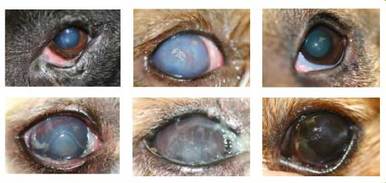 |
| One of the most common clinical signs for dry eye is a mucoid discharge covering the eye (Image Source) |
Keratoconjunctivitis Sicca, also called KCS, is a
condition that affects the eye. It is a very long name for dry eye. This means
the patient is not producing enough tears. Our eyes are constantly bathed in
tears in order to keep the cornea healthy. Without tear production the eyes can
become very painful and lead to other diseases as well as decrease in vision.
 |
| Different stages of dry eye in our pets (Image Source) |
There are many causes for KCS. This could include an
immune mediated process where the body is not allowing proper tear production
or destroying the cells that would produce tears. Other possibilities include
viral infections, some medications, metabolic diseases (think hypothyroidism,
diabetes or Cushing’s disease). Some breeds are also pre-disposed to this
condition. These would include English bull dogs, Westies, pugs, cocker
spaniels, schnauzers and Pekingese.
 |
| This Shirmer Tear test is showing great tear production! (Image Source) |
Symptoms include painful or squinting eyes, red eyes, and
a thick green mucoid discharge covering both eyes. Many times there will be
vessels on covering the surface of the cornea as well. In extreme cases the eye
can become so dry it leads to the formation of a corneal ulcer, which is very
painful. The most common way to confirm diagnosis is to perform a Schirmer Tear
Test. This measures the ability of the eye to produce tears. Normal production
is > 15mm/ minute.
 |
| Management includes eye medication (Image Source) |
Treatment is typically life long and depends on the
severity of the condition. In early stages it is possible to just use
artificial tears or saline to replace the tears. As the condition starts to
progress there are medications that can be placed in the eye on a tail bases
that stimulate tear production. Without treatment, the condition will continue
to worsen and our pets will become even more uncomfortable and possibly lose
their eye sight. For more information on this condition you can visit the
following website here.
No comments:
Post a Comment